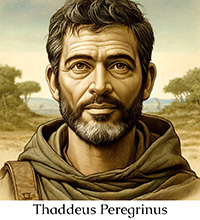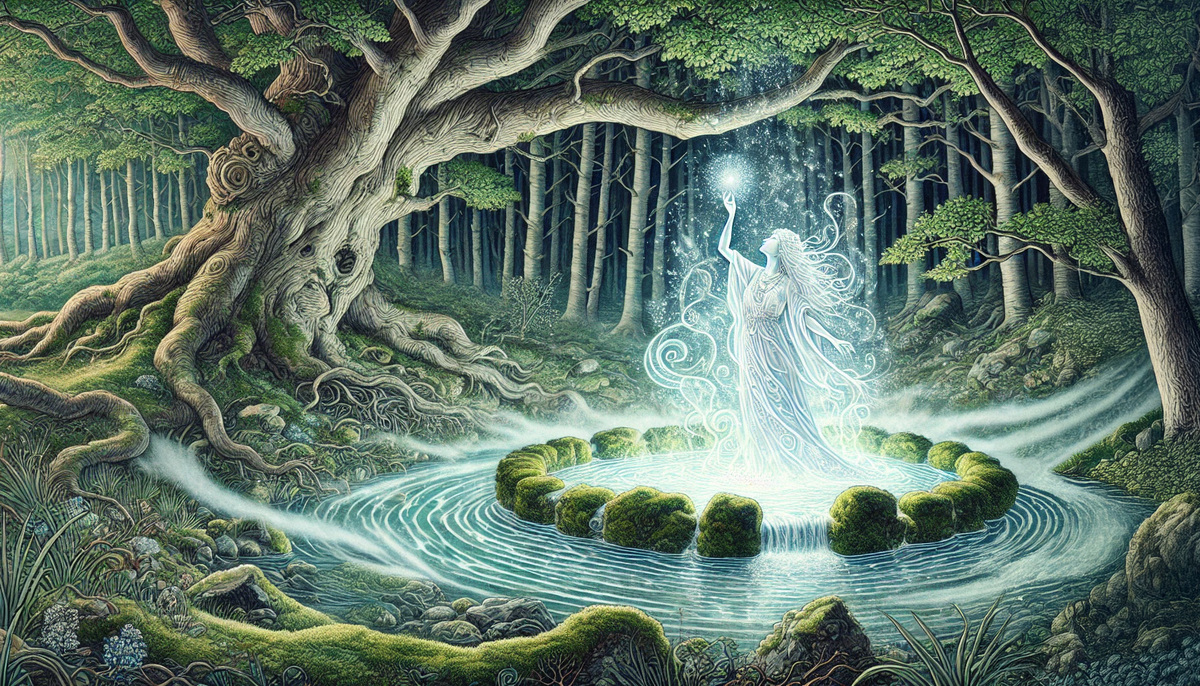Beyond the edge of Lindleigh, where the village fields surrendered to tangled woods and rolling meadows, there was a spring. Its waters ran clear and cold beneath the shade of an ancient oak, bubbling softly over moss and stone before vanishing into the shadows of the forest.
The villagers called it Wildermere Spring, but they seldom gave it much thought. Its waters fed their fields and filled their wells, kept the land green even when other villages turned to dust, yet they paid it no mind. The Wildermere had always been there, and it always would be, they believed—as constant as the hills, as certain as the turning seasons.
But someone always knew better.
Mara was not like the others in Lindleigh.
Her foot turned inward, so she walked with a swaying, uneven gait. Words knotted in her mouth, so tightly she mostly gave up speaking at all. The other children left her alone—not cruelly, just unable to imagine a life unlike their own.
Mara didn’t mind. She wandered where no one else did, toward the edges of things—the places where the wind carried secrets and the trees whispered stories. And then she found the Wildermere Spring.
There, in the clearing of silver light, sat Lyra, an old woman with her gnarled hands tending to stones that lined the spring.
“You’ve come,” Lyra said, as though she had been waiting.
From that day on, Lyra taught Mara the ways of the Wildermere—how to tend the stones, how to sweep the ivy gently from the water’s edge, and, most importantly, how to listen.
“The Wildermere is wild,” Lyra said. “It is not ours to own or tame. But it must be tended, for its waters give life. And when the time comes—when the spring grows weary—it calls for a gift.”
“A gift?” Mara whispered.
Lyra paused, looking at her with kind, knowing eyes. “Someday you’ll understand.”
Years passed. The spring, once vibrant and lively, began to change. Its waters grew sluggish, the hum of its flow faltered. Then one morning, as quietly as the darkness disappears at dawn, Lyra was gone. No one knew where she had gone or why. Yet, to Mara’s wonder, the spring was vibrant once again, spilling over the stones and filling the clearing with renewed majesty.
Mara took up Lyra’s work, tending the spring as though it were a beloved friend, listening to its hum and watching the water’s light dance beneath the great oak’s roots.
The villagers thought little of Mara—a quiet, strange woman who lived on the edge of the woods. They left her alone, and that suited Mara just fine.
One day, Mara found someone by the Wildermere.
A small girl crouched at the water’s edge, her reflection rippling in the silver light. Her hair hung in twisted curtains, and half her face bore the marks of fire— a disfiguring burn that pulled one side of her mouth into a permanent frown.
The girl did not look up as Mara approached.
“Hello,” Mara said softly.
The girl flinched, turning her scarred side away. “Don’t look at me,” she said.
“Of course I will!” said Mara. “I see you for who you really are, a radiant child of the Ineffable One.” Mara said gently. “You don’t need to hide. I love what I see!”
The girl’s dark eyes flicked toward her, full of wariness and wonder. “You aren’t afraid of me?”
Mara smiled faintly. “Heavens no, child! I see YOU. Don’t you know that the Cosmos would be incomplete without you exactly as you are?”
The girl blinked, her wariness softening just a little. “I’m Elspeth,” she said at last. “I… I followed a bird. It led me here.”
Mara nodded. “Perhaps it was showing you the way.”
From that day, every day Elspeth returned to the Wildermere.
Mara was not like the villagers, who turned away from Elspeth’s scarred face, and whispered when they thought she couldn’t hear. With Mara, she had no need to hide. And the Wildermere—the wild, untamed flow of it—did not care about her scars either.
Mara taught her as Lyra had taught her—how to sweep the stones, how to clear the ivy, and how to listen.
“The spring gives life,” Mara said one evening, as Elspeth knelt beside her. “But sometimes it grows weary. And when it does, it calls for a gift.”
“What kind of gift?” Elspeth asked, frowning.
“A tender must give herself to the spring—her life force—so its waters can flow again.”
Elspeth’s eyes darkened. “But that’s not fair.”
Mara placed a hand on her shoulder. “Life gives, and life takes. The Wildermere keeps the village alive, but it cannot flow without those who love it with all their being.”
Elspeth said nothing, but her hands clenched in her lap.
Winter came. The Wildermere grew sluggish, its hum faltering, its light dimming like a star in its final hours. Mara felt it in her bones. The time had come.
On the last night, she tucked Elspeth into the cot in their small hut, smoothing the blankets around her. The girl’s scarred face was peaceful in sleep, the firelight soft against her skin.
Mara lingered a moment, brushing a strand of hair from Elspeth’s forehead.
“You will hear it call,” she whispered. “And when it does, you will know what to do.”
Then she stepped quietly into the night.
The Wildermere was waiting. The air was heavy and still, and its surface was dark, the light at its center no more than a shiver.
Mara knelt by the water, pressing her palm to its cold surface. “I give myself freely,” she whispered. “Let the waters embrace me — body, mind and soul!”
The spring stirred. Its light rose, silver and soft, curling around her arms, her heart, her breath. It lifted her gently, drawing her into its flow—a becoming, not an ending. Her body grew luminous, shimmering like sunlight on water, as the light embraced her fully. A soft mist rose, wrapping her in its delicate folds, and the last thing anyone would have seen was her face — radiant with serenity and joy. Then, she was gone, her essence woven into the Wildermere’s eternal song, the spring surging anew with vibrant life.
Elspeth woke to silence.
The hut was empty, the fire burned low. She stumbled into the frost-touched meadow, her breath catching as she reached the Wildermere.
The spring was alive again. Its waters surged and bubbled, silver light spilling over the stones.
Mara was gone.
Elspeth fell to her knees. By the water’s edge, a single white flower grew, its petals glowing faintly like starlight.
She touched it, and the spring’s hum rose in her ears—soft, endless, alive.
And she understood.
Years passed. The villagers still never thought of the Wildermere, though its waters fed their fields and kept their cisterns full. They never questioned its quiet magic, for it had always been there and always would be.
But if someone wandered to the hollow beyond the hills, they would find an older woman kneeling by the Wildermere, sweeping the stones and listening to its song.
And from the edge of the clearing, another small figure could be seen—a new young girl, with wide eyes and unanswered questions, drawn to the spring by something she could not yet name.
The Wildermere had called her, too.
And the spring flowed on.
— Thaddeus Peregrinus

Thaddeus Peregrinus, a wandering scholar whose journey through distant lands has spanned both time and legend, has spent a lifetime seeking wisdom in the forgotten corners of the world. Although learned in philosophy, ancient texts, and the mysteries of the natural world, Thaddeus has found that true understanding comes not from answers, but from leaning into the unfathomable Mystery of Life. Thaddeus is currently a “Wanderer in Residence” at GrailHeart.
![]()
Thank you for reading GrailHeart!
Your thoughts and suggestions are always welcome—I personally respond to all sincere messages. (Spam is summarily banished to the outer darkness.) You can reach me through my contact form.
This story was penned under the pseudonym Thaddeus Peregrinus, a voice in the GrailHeart creative quest. If you’d like to connect with me directly, please feel free to reach out via the contact form above.
Looking for inspiration or unique gifts? Explore the fine wares at the GrailHeart Shoppe—your support means the world.
May you find serenity in your journey, courage in your challenges, and wisdom in your heart.


